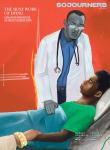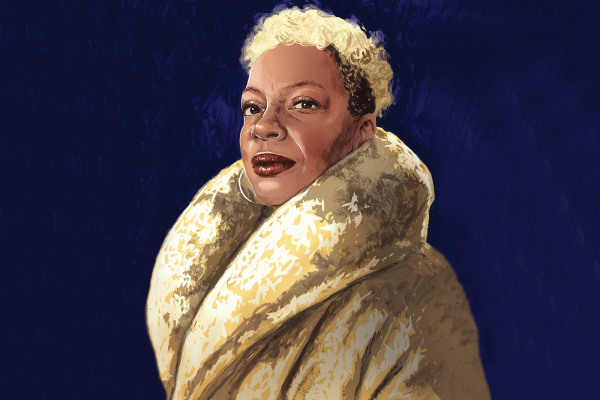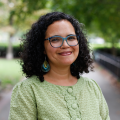AUNJANUE ELLIS-TAYLOR, known for such roles as Hippolyta Freeman in the HBO series Lovecraft Country and Mama in The Color Purple (2023), approaches her acting as an artisan, searching for the right tools with which to craft her characters, she told Sojourners’ assistant editor Josina Guess this spring. Two recent films — Origin (2023) and Exhibiting Forgiveness (2024) — feature powerful performances by Ellis-Taylor and tap into her own yearning for a world in which justice and truth prevail.
Origin (written, produced, and directed by Ava DuVernay) is a biographical drama inspired by Pulitzer-winning journalist Isabel Wilkerson’s process of writing Caste: The Origins of Our Discontents (2020). The film depicts a quest for the origins of why we separate ourselves from one another, even though it destroys us physically, spiritually, and politically. For her moving performance as Wilkerson, Ellis-Taylor traveled to Germany and India, tracing Wilkerson’s observations about the connected histories between Nazism, the caste system, and racism in the United States — deepening our understanding of these bitter human wounds.
Exhibiting Forgiveness is an autobiographical film written and directed by artist Titus Kaphar, whose process-oriented works on canvas, sculpture, and film reveal the layered reality between history and the present. In Exhibiting Forgiveness, an artist named Tarrell experiences rising success while haunted by flashbacks of a childhood riddled with addiction and family violence. Ellis-Taylor plays Joyce, the artist’s mother, who begs her son to forgive because “it’s what the Bible says.”
Both films invite viewers to wrestle with themes of reckoning and healing on a personal and societal level. Ellis-Taylor spoke with Guess about the lessons of Origin in this election year, what she sees as the “burdensome” work of Black forgiveness in the face of ongoing harm, and her commitment to speaking and living into truth, including embracing her queer identity while remaining in the Black church. —The Editors
Josina Guess: Origin and Exhibiting Forgiveness are doing important work, as all art should, on different levels. What’s your artistic process?
Aunjanue Ellis-Taylor: When I’m acting, less so with writing, I don’t do a lot of second-guessing. The economy of [small budget films] doesn’t allow for that. I try to be respectful by doing my homework. I’m always looking for the tools — the nail, the hammer — to build the thing. I’m in constant search of that. That search is urgent and primal. It’s urgent because of the economy of time. And it’s primal because I have this raging desire and commitment to do right by the people I play.
You played Isabel Wilkerson in Origin so beautifully. Have you met her?
I’ve never met her. I was reading [Wilkerson’s] The Warmth of Other Suns, and then the film offer came around. I had not yet read Caste. I was aware of it and was watching her interviews with great interest and curiosity because she’s a great mind. I was surprised by the clarity she has about the moment that we are in right now and the incredibly textured and clarified way that she is able to explain it in a way that can’t be politicized. These realities she writes about can be easily politicized if done by another hand. But she does it with such humanity, care, intelligence, and knowledge that you cannot disagree. You can be mad at her for saying it — but you can’t disagree.
How did Caste speak to you personally?
She explained something about my personal experience of growing up in Mississippi. I did not understand that those [Confederate] statues erected all over the place were a reminder. Those statues aren’t there to honor heroes. They are there to remind you, “Black person,” that you were once enslaved. To touch you on the shoulder and remind you that this is where you came from, and you can so very easily be put right back in that place.
There’s a moment in Origin when your character talks about Mississippi, and I wondered if those lines were written just for you.
That scene where she’s talking about Mississippi takes place at a dinner in Germany. Those words were Ava DuVernay’s words from her script, not from the book. But I did ask Ava for a particular line about Forrest County [Mississippi]. It’s my way of inserting the absurdity that in our everyday, modern, contemporary culture there is a county named after [Nathan Bedford Forrest], a grand wizard of the Ku Klux Klan. That’s insane to me. So, Ava gave me that.
Parts of Origin were filmed in India. You met Dr. Suraj Yengde, a prominent Dalit professor, author, and scholar who played himself in the movie. What did you learn about Dalit rights?
I’d never been to India. I always wanted to go. We arrived in India on my birthday. I had not known that [Martin Luther] King went to India. He had interactions with Dalits that informed him, and they were greatly affected by his presence there. They were singing “We Shall Overcome” [decades ago]!
In my time with Suraj, he was talking about what it’s like for him as a Dalit now. That stuff blew me away. This wasn’t something from history; this was the life they are living right now.
You said Wilkerson’s work is not “politicized,” yet there are forces that don’t want accurate U.S. history taught. How can we talk about humanity and it not become political?
In terms of American demographics, census [data] revealed that white Americans would no longer be the majority [by the mid-2040s]. The reaction to that was the election of [Donald J.] Trump. I’m blown away by that. I feel so naïve. There were people talking to [Trump], saying, “You know what? You could take advantage of the feeling among white Americans. They’re feeling alienated by where this country is going. You could win on that.”
I thought that idea was preposterous. But Isabel Wilkerson makes it very plain. That’s why [some people] felt, “Okay, we’re about to lose control of this thing, so we have to do something.” And the “something” was putting [Trump] in power. How the hell can anyone who says they love America — all the symbols that they hold dear, the exceptionalism, the shining city on a hill — [support a person who is] the opposite of that, who made a mockery of everything that [they] hold dear? There’s a reason behind that, and that is what Ms. Wilkerson makes plain. The reason is they want to maintain a caste system. It’s that simple: You are trying to maintain a caste system that you benefit from. We have to understand that the Supreme Court is operating the way it is operating because it is trying to maintain a caste system. It goes beyond race, because the engine of that is Clarence Thomas, a Black man, but he’s trying to maintain a caste system.
It hurts so bad that [Origin] didn’t reach the masses in a way that we all hoped. So for me that means I have more work to do. The reason I wanted to do the film was because I wanted to be a part of that.
In Origin Wilkerson listens to the 911 call that George Zimmerman made in which you can hear Trayvon Martin’s voice before his murder. I’ve guarded myself from watching the many killings made public in recent years. How did it feel to work with that raw material?
Yeah, you and me. I can’t take it, so I avoided that too. That scene where you see Isabel listening to [the 911 call], that was the first time that I had heard it. What you see in the film is my actual response in real time. I don’t think you can or should fake that. If you are going to take on the responsibility, even as a character, to tell the story of this woman telling the story of this child, then you have to do that.
I loved the scene in Titus Kaphar’s film Exhibiting Forgiveness in which artist Tarrell (André Holland) reads a book to his son (Daniel Berrier). Tarrell repeats the line, “Life doesn’t frighten me at all,” almost as a mantra. Tarrell’s been traumatized by family violence, particularly from his father (John Earl Jelks). Later in the film your character, Joyce, pleads with Tarrell to forgive his father. She says, “People can change.” Do you believe people can change?
Oh, Lord, I hope so. Me being one of them. I hope that I can change. That is a personal plea I have, that I can change in terms of personal destructive behavior.
In both films, your characters are pleading. Isabel Wilkerson is pleading for people to see the humanity in others. Joyce is pleading for personal forgiveness. Talk to me about forgiveness.
In the course of doing films and being in public conversation about our political and social realities, I have really pushed back against this idea of forgiveness. There’s a minister named Kristian A. Smith. His ministry is about healing people who have been traumatized by the church. We’re critiquing this idea of Black forgiveness. After so many interviews, at the end of all the stuff we’ve said, journalists ask, “Is there room for hope?” When one journalist did that, I said, “That’s such a burdensome idea.” Nobody asks that of white people. But somehow Black people have to be having hope in their pockets to distribute, at will, because the white folks need it. And really, it’s not hope they’re interested in. What they want is absolution. What they want is forgiveness. [Smith] preached this brilliant sermon about Black forgiveness. He puts it in historical context and then brings it down to the personal.
What’s interesting about Exhibiting Forgiveness is that [the character Tarrell] has to deal with an idea of forgiveness while continuing to be harmed. Not forgiving something that ended but forgiving someone while they’re still in the practice of harming. That’s the reality of being Black in America. We’re forgiving something that’s still happening. The mechanics of that are off. They’re wrong-minded. That’s almost demanded of Black folks: that we live in that space of constant forgiveness all day long. And that we have to modulate our reactions to certain things and do that constantly just to survive.
Talk to me about your evolving relationship with the church.
As a child there were things I questioned openly — like in the middle of Sunday school — that I felt were misogynistic. I didn’t understand why the man was the head of the household. My alienation started at a young age. But at the same time, I always felt tethered. It always felt like home. In my 30s, I felt rejected. One reason is because of my awareness of my queerness, and I was like, “I’m a Black atheist.” Later I realized that whatever my problems were with the church, I needed that place as a centering part of my life. I am acutely aware of the things I object to or feel I need to fight, in and outside of the church. I feel that I have to be in it in order to do that. The other part is, I feel most alive, I feel I have the most power, when I am in the act of worship with other Black people. For me, the evidence of God is the survival of Black people in the Middle Passage. I need the presence of that culture that was preserved over that sea. I need to be in the presence of that. I find that most profoundly in services in the Black church.
How do you see God in the survival of the Middle Passage?
We didn’t just survive physically. We culturally survived. It generated something that has not existed before. The thing that it generated is foundational to cultures all over the world. The profoundness of that can’t be overstated. I derive meaning, cultural meaning, but also meaning as a human being, from a culture that was built on an ocean. Not on a city, an ocean.
In an interview in Variety two years ago, you came out publicly as queer, although it was a several-year process. How has that affected your relationships with church folk and how you move in the world?
The morning after that story came out, I got separate texts from two different men. One of them, everybody knows his name. The other one is famous in the gospel [music] community. Both, I am pretty sure, are queer. Both texted, “Thank you.” I’ve never had a conversation with either of them about their lives. My saying it [in Variety], and my continuing to say it, matters to people.
The artist Arthur Jafa, who’s from Mississippi, said, “My work doesn’t say anything.” AJ is one of the most brilliant people I’ve ever known. He said, “I’m not interested in saying anything. I’m interested in what my work does.” I have to do something that disables condemnation.
In Origin, Wilkerson pours herself into the work of Caste while deeply grieving lost loved ones. In Exhibiting Forgiveness, Tarrell works out his trauma on the canvas. Is acting an avenue of healing for you?
My healing doesn’t come from acting. I enjoy it, but no. What is great about working on something like Exhibiting Forgiveness is to be part of helping this director [Titus Kaphar]. This is his life. It’s very autobiographical. To go on this journey with him by playing his really complicated mother, that is satisfying. I don’t know how healing it is.
When I get to do something like Origin, I see it as a mission; I see it as social action. It’s fulfilling, but it hasn’t been completed yet. When I can get this movie to penetrate into this conservative chatter, when I can get someone like [U.S. politician] Nikki Haley to answer to the call of Origin, then I’m like, “Okay, now I feel like my job has not been in vain.” But until then, I don’t feel healed by it because the work is not done. So ask me when I get on the other side.

Got something to say about what you're reading? We value your feedback!







